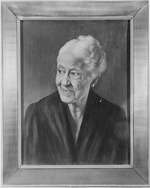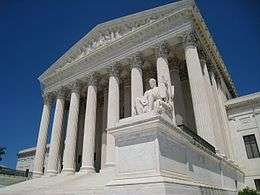Joseph Forer
Joseph Forer (1910–1986[1]) was a 20th-Century American attorney who, with partner David Rein, supported Progressive causes including discriminated communists and African-Americans. They were members of the National Lawyers Guild and its DC chapter. Forer was an expert in the "Lost Laws" of Washington, DC, enacted in 1872–1873, that outlawed segregation at business places.[2]
Background
Forer received his BA from Rutgers University and law degree from the University of Pennsylvania.[3]
Career
New Deal
In the 1930s, like his friend David Rein, Forer worked for the National Labor Relations Board and the Office of Price Administration during the New Deal.[3]
1940s: NLG vs. HUAC
In 1946, David Rein joined Joseph Forer as private practice law partners in Washington, DC. Together, they "represented more than 100 persons who had been termed 'unfriendly' witnesses by the House Committee on Un-American Activities, the Senate Internal Security Subcommittee of the Senate subcommittee headed by the late senator Joseph McCarthy."[4]
As historian Joan Quigley describes:
In the late 1940s, while Congress and the executive branch trawled for evidence of disloyalty and subversion, Rein and Forer immersed themselves in difficult and disfavored causes: opposing the Mundt-Nixon Bill; defending labor unions and alleged Communists; upholding the Bill of Rights. Rein... represented Gerhard Eisler... As progressives and New Deal veterans, Forer and Rein also nurtured ties to the National Lawyers Guild, which HUAC had branded a Communist front in 1944.[3]
Forer was chairman of the District Affairs Committee of the DC chapter of the National Lawyers Guild.[5] Historian Maarten Zwiers wrote:
Joe Forer... was senior partner in Forer and Rein, the Communist Party's leading law firm in the capital. He had defended people accused of communist sympathies before Eastland's Internal Security Subcommittee on several occasions...[6]
He also refers to him as "the Communist Party's lawyer."[6]
_1977%2C_MiNr_2266.jpg)
Historian Marvin Caplan wrote:
When a staff attorney at a HUAC hearing asked Joe Forer how many times he had appeared before the committee, Forer couldn't remember. Too many times, he said, to be able to give an exact figure.
Attorney Victor Rabinowitz recalled in his memoir that Forer's circle of communist-supportive lawyers stretched to New York City (headquarters of the National Lawyers Guild). They included Harry Sacher, Abe Unger, David Freeman, David Rein, and Rabinowitz himself, "all lawyers active in the representation of witnesses before congressional committees." He explained:
Unger and Freeman were attorneys for the (Communist) Party; Sacher had been lead defense in the prosecution of Communist party leaders under the Smith Act; I was a member of the Party and the others were close to it if not members. We certainly weren't making Party policy, but our views would have some influence on the Party and its members.[7]
In 1948, Lee Pressman joined Forer in representing Gerhard Eisler and four others (Irving Potash, vice president of the Fur and Leather Workers Union; Ferdinand C. Smith, secretary of the National Maritime Union; Charles A. Doyle of the Gas, Coke and Chemical Workers Union, and John Williamson, labor secretary of the CPUSA). On May 5, 1946, Pressman and Forer received a preliminary injunction so their defendants might have hearings with examiners unconnected with the investigations and prosecutions by examiners of the Immigration and Naturalization Service.[8]
1950s: McCarthyism

From 1951 to 1953, Forer, with John Abt and Vito Marcantonio, represented the CPUSA in the matter of Herbert Brownell, Jr., Attorney General of the United States, Petitioner v. the Communist Party of the United States of America, Respondent.[9][10][11][12]
On April 24, 1953, Forer represented William Frauenglass, an English teacher at the James Madison High School in Brooklyn, New York, before the United States Senate Subcommittee on Internal Security.[13] Reading of the testimony, world-famous scientist Albert Einstein wrote Frauenglass a letter,[14] which reached the New York Times (Einstein had added a postscript stating the letter "need not remain confidential"), advising "every intellectual called before a Congressional investigating committee should refuse to testify, and 'must be prepared for jail and economic ruin, in short, for the sacrifice of his personal welfare in the interest of the cultural welfare of his country'."[15] Frauenglass did refuse to testify further – and he did lose his job.[16] (See "Political views of Albert Einstein")
In 1958, Forer represented Clara Hutcherson Saba before HUAC.[17]
Lost Laws and DC v. John R. Thompson Co.
Mary Church Terrell

In May 1949, Dr. Mary Church Terrell decided to take on the issue of desegregation head-on. She consulted Forer. Forer led the National Lawyer Guild's DC chapter in submitting an opinion in their favor. With such advice, Dr. Terrell and colleagues Clark F. King, Essie Thompson, and Arthur F. Elmer entered the segregated Thompson's Restaurant, next door to the offices of Forer and Rein's office on 14th Street, NW, in Washington, DC, between H Street and New York Avenue and across the street from the Trans-Lux Theatre. When refused service, Terrell & Co. sued.
Attorney Ringgold Hart, representing Thompson, argued on April 1, 1950, that District laws were unconstitutional.
Regardless, Forer's research found that the U.S. Congress had jurisdiction over DC and so could overrule segregation; Charles H. Houston, dean of Howard University Law School concurred.
District of Columbia v. John R. Thompson Co.
The case District of Columbia v. John R. Thompson Co. reached the U.S. Supreme Court. Forer and Rein argued the case. On June 8, 1953, the court ruled that segregated eating places in Washington, DC, were unconstitutional.
The Washington Post recounted in 1985, "Four days after the Supreme Court ruled, Mary Terrell and the three other original complainants went back to Thompson's. Joe Forer followed them in. As he recalls the moment, the manager, himself, came over and personally, even obsequiously, carried Mary Terrell's tray to the table."[5][18][19][3]
Other cases
Forer and Rein served the rights of striking workers, foreign-born aliens (with leftist leanings, e.g., Gerhard Eisler), and servicemen. They won for the National Council for American-Soviet Friendship the right to contest in court its designation by the attorney general as a "subversive organization." They also represented members of the press on strike against the Washington Post in 1975.[4]
In 1960–1961, Forer and John Abt represented the CPUSA in Communist Party of the United States vs. Subversive Activities Control Board, 367 U.S. 1 (1961).[20]
FBI target
In 1977, a release of internal memos of the FBI revealed, according to the Washington Post, that:
An Oct. 4, 1951 memo to Hoover said that a search of trash at the Washington offices of guild lawyers Joseph Forer and David Rein had uncovered a draft resolution urging President Truman to authorize a citizens' investigation of the FBI because of its alleged excesses in loyalty checks.[21]
Retirement
Forer retired from practice with Rein in July 1978.[4]
Personal and death
Forer's daughter, Jane F. Gentleman, is a notable statistician.[22][23] He was the uncle of author Richard Forer.[24]
Forer, Rein, and many friends and associates lived at Trenton Terrace, 950 Mississippi Avenue SE, Washington DC 20032.[5]
As a child, Carl Bernstein knew Joseph Forer and David Rein.[19]
See also
References
- ↑ "Forer and Rein (Washington, D.C.)". WorldCat OCLC Identities. 2010. Retrieved 20 March 2017.
- ↑ "Metro Scene". Washington Post. 26 June 1986. Retrieved 20 March 2017.
- 1 2 3 4 Quigley, Joan (2016). Just Another Southern Town: Mary Church Terrell's Fight for Racial Justice in the Nation's Capital. Oxford University Press. pp. 4 (Terrell), 13 (location), 19, 144 (schooling, career), 155, 164, 227. Retrieved 20 March 2017.
- 1 2 3 "David Rein, Civil Rights Lawyer, Dies". Washington Post. 15 August 1975. Retrieved 20 March 2017.
- 1 2 3 Caplan, Marvin (1999). Farther Along: A Civil Rights Memoir. LSU Press. p. 113 (chairman), 114 (afternoon), 115 (NLG opinion), 116 (next door), 122 (Trenton Terrace), 131 (HUAC), 140 (Terrell's tray). Retrieved 20 March 2017.
- 1 2 Zwiers, Maarten (2015). Senator James Eastland: Mississippi's Jim Crow Democrat. LSU Press. p. 1. Retrieved 20 March 2017.
- ↑ Rabinowitz, Victor (1996). Unrepentant Leftist: A Lawyer's Memoir. University of Illinois Press. p. 122. Retrieved 20 March 2017.
- ↑ "Eisler, 4 Others Win New Hearings: Goldsborough Enjoins Their Deportation Pending Compliance With 1946 Law". New York Times. 6 May 1948. p. 18. Retrieved 18 March 2017.
- ↑ "Subversive Activities Control Board: Herbert Brownell, Jr., Attorney General of the United States, Petitioner v. the Communist Party of the United States of America, Respondent: Report of the Board". Washington, DC: U.S. Government Printing Office. 1953. p. 1. Retrieved 21 March 2017.
- ↑ "Home". I Vote My Conscience: The Debates, Speeches, and Writings of Vito Marcantonio. Retrieved 24 March 2017.
- ↑ Marcantonio, Vito (1956). I Vote My Conscience. Vito Marcantonio Memorial. pp. 477–482. Retrieved 24 March 2017.
- ↑ Marcantonio, Vito (1956). Annette T. Rubenstein, ed. I Vote My Conscience. VitoMarcantonio.com. Retrieved 24 March 2017.
- ↑ Subversive Influence in the Educational Process. US GPO. 1952. pp. 838–841. Retrieved 3 September 2018.
- ↑
. Einstein Virtuell http://einstein-virtuell.mpiwg-berlin.mpg.de/VEA/SC516287227_MOD-1744214250_SEQ1202484_SL861364620_en.html. Retrieved 3 September 2018. Missing or empty
|title=(help) - ↑ Buder, Leonard (12 June 1953). "Refuse to Testify,' Einstein Advises Intellectuals Called In by Congress". New York Times. Retrieved 3 September 2018.
- ↑ "Einstein, Plumbers, and McCarthyism". Institute for Advanced Study. 2017. Retrieved 3 September 2018.
- ↑ "Communist Activities in the South". U.S. Government Printing Office. July 1958. p. 2648. Retrieved 20 March 2017.
- ↑ "City Voices". Washington Post. 25 April 1985. Retrieved 20 March 2017.
- 1 2 Bernstein, Carl (20 January 2009). "The Washington I Once Knew". Daily Beast. Retrieved 20 March 2017.
- ↑ "Communist Party of the United States vs. Subversive Activities Control Board, 367 U.S. 1 (1961)". The Fire. 25 August 1977. Retrieved 20 March 2017.
- ↑ McBee, Susanna (25 August 1977). "FBI Sifted Trash, Tapped Phones of Lawyers Guild". Washington Post. Retrieved 20 March 2017.
- ↑ "Florence Forer", Paid death notices, The Washington Post, March 29, 2005, retrieved 2017-11-27
- ↑ First Annual Janet L. Norwood Award, University of Alabama School of Public Health, retrieved 2017-11-27
- ↑ "Bio". RichardForer.com. Retrieved 20 March 2017.
External sources
- "Forer and Rein (Washington, D.C.)". WorldCat OCLC Identities. 2010. Retrieved 20 March 2017.
- VitoAntonio.com: Image of Joseph Forer with John Abt and Vito Marcantonio
